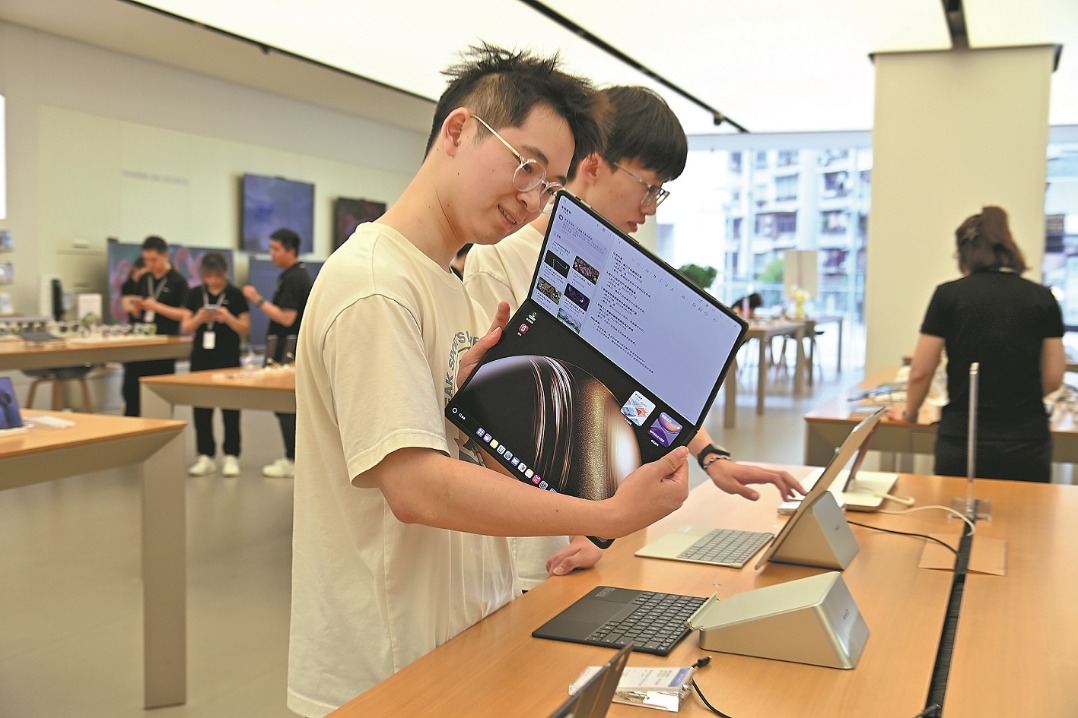Consumption set to continue robust growth


Bolstered by sustained policy support for trade-in programs, China's consumption is likely to continue its robust growth momentum in the second half of the year, better underpinning the country's stable economic growth amid mounting external uncertainties, analysts said.
China still has ample fiscal headroom to reinforce its trade-in initiative later this year should consumer demand exhaust its initial 300 billion yuan ($42 billion) allocation, they said, emphasizing that similar policy incentives could be extended to the service sector to foster more sustainable consumption growth.
On Tuesday, the Ministry of Finance announced the issuance of 11 ultra-long-term treasury bonds in the third quarter, with four of them seeing their timelines accelerated compared with the previous plan released in April. This will help maintain a continuous flow of funding to support policies meant to boost consumption, analysts said.
According to the National Development and Reform Commission, China's top economic regulator, the third group of fiscal funding through ultra-long-term treasury bonds for the consumer goods trade-in program is scheduled to be allocated in July.
The central government has earmarked 300 billion yuan in ultra-long-term treasury bonds to support the trade-in program for the whole year. The first two groups of fiscal funding, totaling 162 billion yuan, were allocated in January and April.
"If the remaining 138 billion yuan runs out ahead of schedule, the possibility of unveiling additional funding this year cannot be ruled out," said Zhao Wei, chief economist at Shenwan Hongyuan Securities.
"As the trade war initiated by the United States still weighs on China's economy, efforts to shore up domestic demand will be of paramount importance to mitigate external shocks and maintain steady growth," he said.
By avoiding a one-time, large-scale fund injection that could disrupt market dynamics, the phased allocation of the fiscal funds helps create a stable and supportive environment for the consumption recovery to take hold throughout the year, Zhao added.
In late June, the People's Bank of China, the country's central bank, also pledged to leverage various tools in support of the trade-in programs, such as increasing credit support for recycling companies and home renovation suppliers and fast-track financing for manufacturers of energy-efficient smart home products.
"Boosted by the trade-in programs, sales of household appliances, furniture and communication devices have registered rapid growth. Sales related to trade-ins have surpassed 1.4 trillion yuan so far this year," said Li Chao, a spokeswoman for the National Development and Reform Commission, when addressing a news conference on June 26.
According to data from the National Bureau of Statistics, China's consumer spending in May posted its strongest monthly growth since 2024, with retail sales of consumer goods expanding 6.4 percent year-on-year in May, a 1.3 percentage point increase from April.
Experts cautioned that although the trade-in policies have been effective in driving sales of consumers goods, they also carry the risk of front-loading consumer demand, which could create challenges down the line.
"Providing similar consumption incentives to promote service sector spending could become a key policy lever going forward," said Jiang Zhao, an associate researcher at the Chinese Academy of International Trade and Economic Cooperation.
Jiang noted that development patterns in advanced economies indicate that upon entering high-income status, nations typically experience a gradual rise in the proportion of service consumption. As China approaches this threshold, its consumption structure is transitioning from being focused on goods to being focused on both goods and services, he said.
Nevertheless, service consumption spans diverse sectors such as elderly care, tourism, fitness and healthcare, implying that subsidy programs would demand substantial fiscal funding and pose significant oversight challenges, Jiang said, adding that any decision to implement such incentives would require prudent assessment based on practical conditions.
wangkeju@chinadaily.com.cn




































